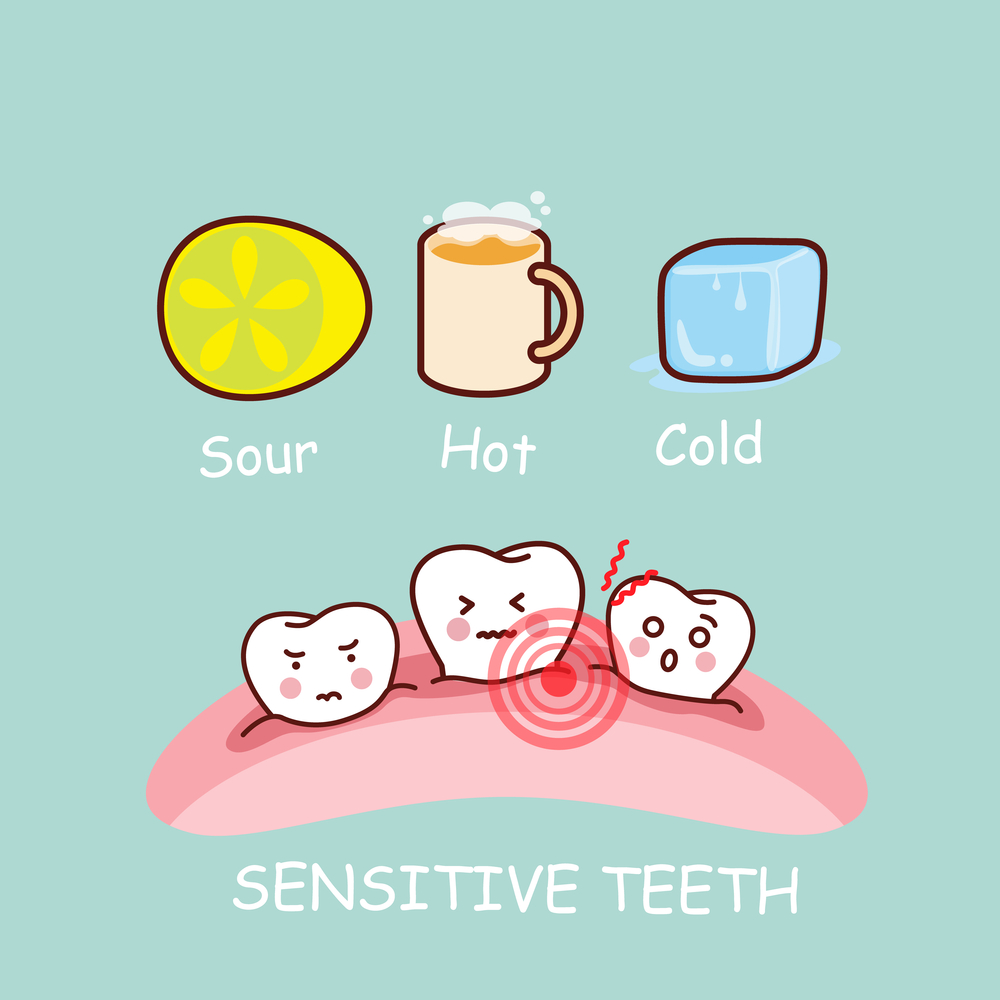Do you cringe at the thought of biting into an ice cream cone or sipping on a hot cup of coffee? If so, you may be one of the millions of people who experience teeth sensitivity. It’s like a sudden jolt that shoots through your mouth, causing discomfort and making everyday activities a painful ordeal. But fear not! In this blog post, we’ll dive deep into the world of teeth sensitivity – uncovering its causes, exploring effective treatments, and discovering ways to prevent it altogether. So sit back, relax (but not too much), and let’s embark on this journey to conquer tooth sensitivity once and for all!
The different types of teeth sensitivity

Teeth Sensitivity Causes
Teeth sensitivity can manifest in different ways, and understanding the various types is crucial in finding the right treatment. The most common type of sensitivity is dentin hypersensitivity, which occurs when the protective layer of enamel on your teeth wears down, exposing the sensitive dentin underneath. This can result from tooth decay, gum disease, or aggressive brushing.
Another type of sensitivity is root sensitivity. When gums recede due to age or improper brushing technique, it exposes the roots of your teeth. These roots lack a protective layer of enamel and are more susceptible to sensitivity.
Tooth sensitivity can also be caused by cracked or chipped teeth. These fractures create pathways for hot or cold stimuli to reach nerve endings within your teeth, triggering discomfort.
Furthermore, some individuals may experience temporary tooth sensitivity after dental procedures like fillings or crown placements. This typically subsides on its own over time as the tooth adjusts to these changes.
Identifying the specific type of teeth sensitivity you’re dealing with will help you determine appropriate treatment options and preventive measures moving forward. So don’t brush aside those twinges – get acquainted with your particular brand of sensitivity.
Causes of teeth sensitivity
Teeth sensitivity can be caused by a variety of factors. One common cause is the erosion of tooth enamel, which exposes the sensitive dentin underneath. This erosion can occur due to aggressive brushing, acidic foods and drinks, or acid reflux.
Another potential cause of teeth sensitivity is gum recession. When the gums recede, it exposes the roots of the teeth which are not protected by enamel. This can lead to increased sensitivity when eating or drinking hot or cold substances.
Tooth decay and cavities can also contribute to teeth sensitivity. As bacteria break down sugars and produce acid in the mouth, they can weaken and damage tooth enamel, leading to sensitivity.
In some cases, dental procedures such as fillings or crowns can cause temporary sensitivity. This usually resolves on its own within a few weeks.
Grinding or clenching your teeth (bruxism) can wear down tooth enamel over time and result in increased sensitivity.
Understanding the underlying causes of teeth sensitivity is crucial in determining appropriate treatment options. By addressing these causes head-on, individuals may find relief from their discomfort and enjoy a healthier smile overall.
Teeth sensitivity treatments
Teeth sensitivity can be quite uncomfortable and even painful at times. Thankfully, there are several treatments available that can help alleviate the discomfort and improve your overall dental health.
One of the most common treatments for teeth sensitivity is using desensitizing toothpaste. These toothpastes contain compounds that block the nerve endings in your teeth, reducing their sensitivity to hot or cold temperatures. Simply brushing with this toothpaste regularly can provide relief over time.
Another effective treatment option is fluoride varnishes or gels. These products work by strengthening the enamel on your teeth, making them less prone to sensitivity. Your dentist can apply these directly to your teeth during a visit, providing you with immediate relief.
For more severe cases of teeth sensitivity, dentists may recommend bonding agents or sealants. These substances are applied to the exposed areas of your teeth to create a protective layer and prevent further damage.
In some instances, dental procedures such as root canal therapy or gum grafts may be necessary if the cause of your sensitivity is due to underlying issues such as decay or receding gums.
It’s important to remember that while these treatments provide temporary relief from symptoms, they don’t address the root cause of teeth sensitivity. It’s crucial to maintain good oral hygiene practices and consult with a dentist for proper diagnosis and long-term solutions.
Ways to prevent teeth sensitivity
Taking care of our teeth is important for overall oral health. And when it comes to preventing teeth sensitivity, there are several steps we can take.
It’s crucial to maintain a proper oral hygiene routine. This includes brushing your teeth twice a day with a soft-bristled toothbrush and fluoride toothpaste. Be gentle while brushing, as aggressive brushing can wear down the enamel and expose the sensitive dentin underneath.
In addition to regular brushing, don’t forget about flossing! Flossing helps remove plaque and food particles from between your teeth and along the gumline, reducing the risk of gum disease that can lead to sensitivity.
Another way to prevent sensitivity is by being mindful of what you eat and drink. Acidic foods and beverages like citrus fruits, soda, and coffee can erode tooth enamel over time. Limiting their consumption or rinsing your mouth with water after indulging in them can help protect against sensitivity.
Using a mouthguard during activities that may cause trauma to your teeth is also recommended. Protecting your pearly whites from unnecessary damage will reduce the chances of developing sensitivity later on.
Make sure you visit your dentist regularly for check-ups and professional cleanings. A dental professional can identify early signs of tooth decay or gum recession which could contribute to sensitivity issues if left untreated.
Prevention is key when it comes to keeping those pearly whites healthy and free from discomfort!
When to see a dentist?
Knowing when to seek professional dental care is crucial when dealing with teeth sensitivity. While there are steps you can take at home to manage and prevent sensitivity, it’s important to recognize the signs that indicate a visit to the dentist is necessary.
If your tooth sensitivity persists or worsens despite trying various remedies, it’s time to schedule an appointment with your dentist. They will be able to evaluate your oral health, identify any underlying causes of sensitivity, and recommend appropriate treatments.
Additionally, if you experience severe pain from tooth sensitivity or notice any other concerning symptoms such as swollen gums or loose teeth, it’s important not to delay seeking dental attention. These could be indications of more serious dental issues that require immediate treatment.
Regular check-ups with your dentist are also essential for maintaining good oral health and preventing future problems. During these visits, your dentist can identify early signs of teeth sensitivity before they become more severe and provide personalized recommendations for managing and preventing further discomfort.
Remember that every individual’s situation is unique, so what works for one person may not work for another. By working closely with your dentist and following their advice on proper oral hygiene practices and treatments tailored specifically for you, you can find relief from teeth sensitivity and maintain a healthy smile.







